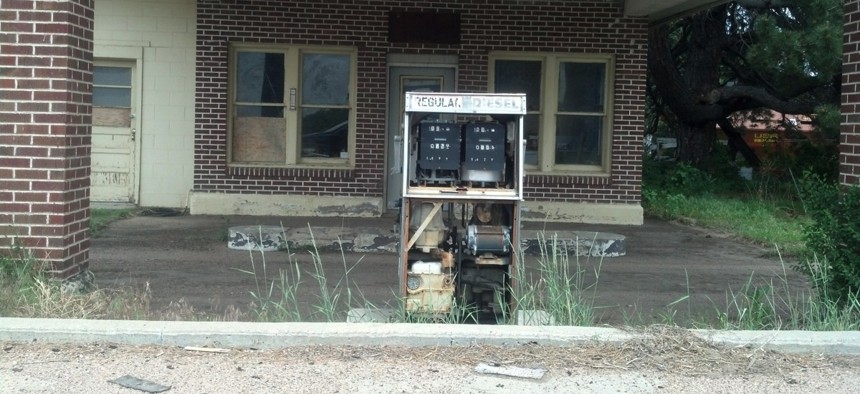What Will Happen to Truck Stop Towns When Driverless Truck Technology Expands?

An abandoned gas station along U.S. 30 in Roscoe, Nebraska. Michael Grass / RouteFifty.com
In just a few years, communities that depend on the trucking industry for their vitality will be facing major economic disruption.
Roscoe, Nebraska, is a good place to contemplate how the evolution of long-haul travel can change a community. This unincorporated settlement—some classify Roscoe as a “semi-ghost town”—sits about seven miles east of the city of Ogallala along U.S. 30, which follows the old Lincoln Highway route and before that, various overland migration trails to California, Oregon and Utah.
Just off U.S. 30, opposite the Union Pacific freight-rail tracks, there’s an abandoned gas station with its former pump, pictured above, standing as a relic from a different era of travel when overland motorists crossed this sparsely populated area of western Nebraska on the Lincoln Highway, the nation’s first transcontinental highway.
That was before Interstate 80 was constructed following a parallel route a few miles to the south. And that highway, like so many other Interstate highways, allowed cross-country traffic—including truck drivers hauling freight—to bypass the smaller towns and medium-size cities that spring up along the older routes.
Today, at the local exit leading from I-80 to Roscoe, there are no traveler services. There’s a rest area a few miles down the road and plenty more traveler services clustered nearby at the exit for Ogallala, which includes outposts for TravelCenters of America and Sapp Bros. Travel Centers, plus Denny’s, a Holiday Inn Express and Days Inn.
While autonomous vehicle technology has raised big questions about the future of mobility in urban areas, the long-term impact of driverless innovation on small-town economies supported by the trucking industry is perhaps less understood.
But it’s safe to say that the future industry disruption that driverless semi-trucks hauling freight will bring is poised to cause some serious pain for local communities that depend on human truck drivers.
In a recent Medium post, Scott Santens, a New Orleans-based writer-blogger who focuses on the intersection of poverty, inequality and technological advancement, writes about the looming “one-two punch to America’s gut” that will come from driverless trucks:
We are facing the decimation of entire small town economies, a disruption the likes of which we haven’t seen since the construction of the interstate highway system itself bypassed entire towns.
Santens continues:
Those working in these restaurants and motels along truck-driving routes are also consumers within their own local economies. Think about what a server spends her paycheck and tips on in her own community, and what a motel maid spends from her earnings into the same community. That spending creates other paychecks in turn. So now we’re not only talking about millions more who depend on those who depend on truck drivers, but we’re also talking about entire small town communities full of people who depend on all of the above in more rural areas. With any amount of reduced consumer spending, these local economies will shrink.
What could that mean for a state like Nebraska?
According to the Nebraska Trucking Association, the trucking industry employs one out of every 12 workers in the state, roughly 63,000 jobs. Trucks carry 76 percent of manufactured tonnage in the state. And more than 48 percent of Nebraska communities rely on trucks to move their goods.
Driverless trucks will still need to refuel on their cross-country treks, but advances in technology will, in time, reduce the need to have as many humans involved the trucking industry.
The first driverless truck hit the roads in Nevada this month.
And while there’s still a lot of testing ahead for autonomous driving technology in the trucking industry, Santens writes it’s a question of when, not if, major disruption is coming for communities that depend on trucking. “. . . [We’re] looking at a window of massive disruption starting somewhere between 2020 and 2030,” he writes.
And that could lead to plenty of truck stop settlements across the nation ending up like Roscoe, undermined by big changes in the way we travel and ship goods on America’s highway network.
NEXT STORY: Struggling with sluggish VDI? Try graphics acceleration






